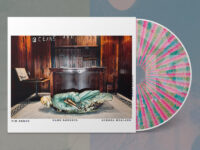In a time when it seems to pay off more to play it safe than it does to take creative chances, Ran Blake and Sara Serpa provide refreshing respite on Aurora. Their second album deals a new hand to some jazz favorites, digging into a range of standards with exhilarating musicality.
Blake and Serpa began playing together when the singer attended the New England Conservatory and the pianist served as her mentor. “I feel I am a bit more mature,” says Serpa. “The first album (Camera Obscura) was much more experimental for me since I didn’t know what it would sound like. This second album is almost like a rebirth of the duo … I feel Ran and I are more comfortable playing with each other.”
That maturity shines through, but it’s also easy to tell that the duo has blossomed creatively. Blake and Serpa play wonderfully off each other, with compelling piano lines engaging with elaborate and angular vocals in seamless fashion.
Blake’s career, a six decade roller-coaster ride, has found him carving out space as one of the finest improvisers going. His tonal work-outs combine with his more melodic sensibilities, creating a patchwork of ivory-tinkling that is at turns revitalizing and vulnerable.
Serpa is the perfect complement. The New York-based composer and vocalist has compiled an adventurous career both as a leader and as accompaniment. She debuted in 2008 with Praia and has mastered the navigation of changing dynamics. She is a stunningly shrewd singer on top of it all and her versatility makes Aurora head into uncharted waters with a certain degree of comfort.
That’s not to say that this isn’t a challenging disc. Consider “Dr. Mabuse,” inspired by the Konrad Elfer score to Fritz Lang’s Dr. Mabuse: The Gambler. The piece is an emotional work-out that finds Serpa shifting through wordless tones while Blake punches accents and sharp, vivid lines into the mix.
Or contemplate “Love Lament,” a piece written by R.B. Lynch for Abbey Lincoln. Here, Serpa and Blake play with tradition but swing off on a hard turn with well-lit staccato cuffs and kaleidoscopic dynamics. There’s an ominous sense skulking beneath the dishonestly lovely surface, a tenor that pianist and singer edge closer to the top.
Aurora is a rousing, diverse, stimulating program from Serpa and Blake. From a laid-bare performance of Billie Holiday’s “Strange Fruit” to the bouncy pithiness of “Fine and Dandy,” this is an undertaking that does not dare play it safe.
[amazon_enhanced asin=”B00A8U2VKY” container=”” container_class=”” price=”All” background_color=”FFFFFF” link_color=”000000″ text_color=”0000FF” /] [amazon_enhanced asin=”B000EBGFUE” container=”” container_class=”” price=”All” background_color=”FFFFFF” link_color=”000000″ text_color=”0000FF” /] [amazon_enhanced asin=”B0042KZYO6″ container=”” container_class=”” price=”All” background_color=”FFFFFF” link_color=”000000″ text_color=”0000FF” /] [amazon_enhanced asin=”B005OKEYVM” container=”” container_class=”” price=”All” background_color=”FFFFFF” link_color=”000000″ text_color=”0000FF” /] [amazon_enhanced asin=”B004ULO0WO” container=”” container_class=”” price=”All” background_color=”FFFFFF” link_color=”000000″ text_color=”0000FF” /]
- The Black Keys Pushed Forward Without Losing Their Way on ‘Turn Blue’ - May 12, 2019
- David Ian’s ‘Valentine’s Day’ Made Romance Romantic Again - February 14, 2019
- Jerry Kalaf – Welcome to Earth (2015) - February 6, 2015




